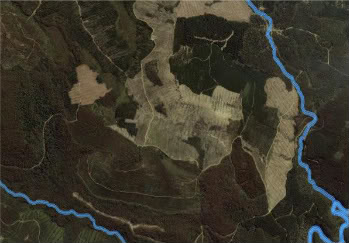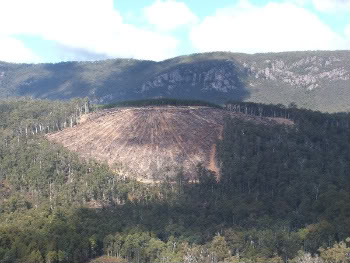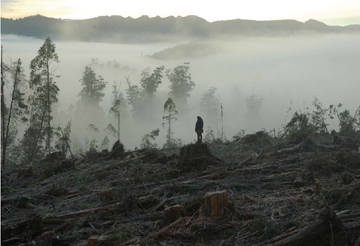Gunns Limited, an Australian logging company, that has been engaged in a long-running battle with environmentalists over the firm’s cutting of old-growth forests on Tasmania, conceded defeat Thursday, reports the Environment News Service.
Speaking at the ForestWorks conference in Melboure, Australia, Gunns chief executive Greg L’Estrange said the company will transition its operations from native forests to plantations, effectively ending the practice that has won the company so much animosity from green groups over the years.
“This may well mean transitioning to plantations but move we must, for the conflict must end,” said L’Estrange, alluding to the decades-long campaign by environmentalists against the company. “Through this inclusive approach we will find joint solutions to age-old conflicts and move beyond to a real, sustainable forest industry.”
|
|
“Over the past year we have made a clear, directional statement that our future will be in the development and use of plantation-based products because we must change in order to achieve broader community and investor support,” said L’Estrange. “Native forest is not part of our future.”
“We see that the conflict largely has to end,” he continued. “The vast support of the Australian population is with the environmental non-government organizations.”
Beyond public relations damage, Gunns has suffered bruising court battles over the past decades in its efforts to suppress protests. In 2009 the company lost a case filed against 20 defendants, including The Wilderness Society. At part of the settlement, Gunns paid the NGO AU$350,000 in legal fees.
Gunns is still planning to build the AU$2 billion Bell Bay Pulp Mill, but it will apparently be fueled by plantation timber. Gunns has more than 900 square kilometers of plantations, making it Tasmania’s largest private landowner.
 Clear cuts south of New Norfolk as seen through Google Earth. Image courtesy of Pete Godfrey. |
The announcement was welcomed by environmental groups that have long fought the company.
“Community and environment groups working for decades for the protection of Tasmania’s irreplaceable native forests see Gunns announcement as a very welcome breakthrough,” Wilderness Society spokesperson Paul Oosting said in a statement. “We look forward to protecting Tasmania’s forests and supporting new lasting jobs by continuing to work with the timber industry to pave a way forward.”
“If Gunns moves out of native forest logging and concentrates on processing its plantations, it will protect jobs in the timber industry,” added Lindsay Hesketh, National Forest Campaigner for the Australian Conservation Foundation. “It’s time to look at forests in Tasmania in a new way because the old way – a battle between jobs and forests – has protected neither. It ruptured the community, failed to protect jobs and destroyed Tasmanian’s natural heritage.”
 Clear-cut in Tasmania. Photo by: Pete Godfrey. |
The Wilderness Society, Environment Tasmania, and the Australian Conservation Foundation say they are currently engaged in talks with forestry industry representatives on “options for the protection of native forests, the creation of a sustainable timber industry and the delivery of an end to the decades-long forest conflict.”
“We encourage all players to continue dialogue to find common ground on these important issues,” said Hesketh.
“We now have the best opportunity in decades to resolve the forest conflict in Tasmania,” added Environment Tasmania Director Dr Phill Pullinger. “It is vitally important for Tasmania’s future that we protect our native forests, create a timber industry that Tasmanians can be proud of, and heal the deep divisions in our community. We have to find a solution to the conflict over forestry that is durable, lasting and involves the whole Tasmanian community.”
Related articles
Tasmania gets Australia’s first CCB-certified REDD deal
(07/27/2009) A forest conservation project in Tasmania has become Australia’s first Reduced Emissions from Deforestation and Degradation (REDD) project to meet Climate, Community and Biodiversity Standards.
A Tasmanian tragedy? : How the forestry industry has torn an island apart

(07/02/2009) This is by no means a new battle: in fact, Tasmanian industrial foresters and environmentalists have been fighting over the issue of clearcutting the island’s forests for decades. The battle—some would probably prefer ‘war’—is over nothing less than the future of Tasmania. Some Tasmanians see the rich forests that surround them in terms of income, dollars and cents; they see money literally growing on trees, or more appropriately growing on monoculture plantations and government owned native forests. They see the wilderness of Tasmania as an exploitative resource.
Japanese paper firms contribute to destruction of old-growth forests in Tasmania
(02/15/2009) A new report released by Australian conservation groups The Wilderness Society and Still Wild, Still Threatened shows that despite claims to the contrary, Japanese paper manufacturers are the purchasers of wood chips derived from the destruction of Tasmania’s old growth forests.















